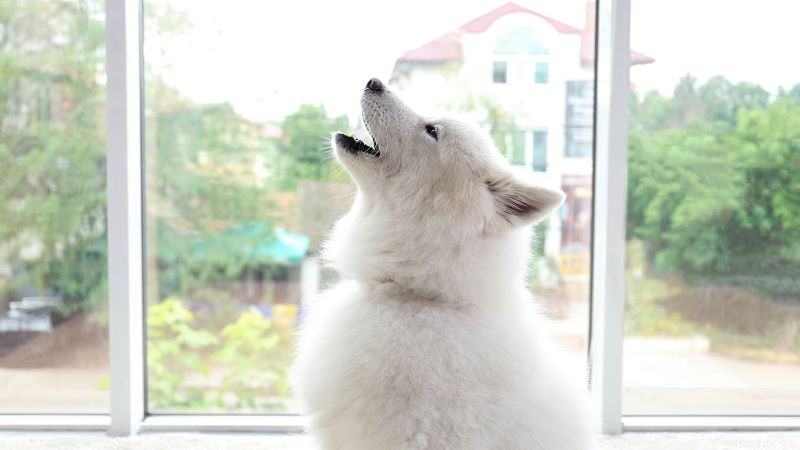Our dog was a barker when she was a puppy. She did not bark when someone came to the door or when she saw a squirrel outside, she barked seemingly out of the blue. She would come into the room where we were watching tv or having a conversation and just bark at us. So, we bought Soggy Doggy (a spray bottle in the shape of a dog) and squirted her with water. Looking back it seems so inhumane, but we were at our wit’s end. We didn’t know what to do to stop the annoying barking! Did it work? No! In fact, sometimes I think it made it worse. So, what to do when your dog barks incessantly and you just can’t get him to stop? Well, first let’s get to the bottom of why your dog barks.
5 reasons dogs bark
1. Genetic predisposition
Certain dogs, mostly small dogs and terriers, are prone to bark. They’ll generally bark at anything that moves. Akc.org calls terriers “feisty, energetic dogs who have ‘little tolerance for other animals’.” A squirrel in the yard is enough to set them off.
2. Territorial marking
Mostly unneutered males and guard dogs, these territorial dogs believe by barking they are protecting their yard from intruders, such as the mailman.
3. Demanding attention/food
This was our precious pooch’s problem. Summer just wanted our attention, and barking was the way she chose to demand it. In her later years, she barked to let us know she wanted her dinner.
4. Boredom
Breeds such as collies and retrievers were bred to herd and work all day, so they naturally require a lot of exercise. When they do not receive their required exercise, these large dogs can resort to chewing, digging, and yes, barking.
5. Anxiety
Shelter dogs, dogs who haven’t been socialized or trained, and dogs who spend a lot of time alone can suffer from anxiety which may lead to fits of barking.
Soulutions to curb barking
1. Monitor barking
When you are home with your dog, tell him no when he barks at passersby or squirrels. Staying on top of his barking when you are at home can prevent it from happening when you are away.
2. Keep your dog contained.
Limit your dog's ability to look through windows that view more active sidewalks with increased outside stimuli. You may also want to consider neutering a male dog, as this can curb genetically protective instincts.
3. Don’t squirt your dog!
We were reinforcing Summer’s behavior with Soggy Doggy. She was getting our attention, even though it was negative. Tip number eight on Petfinder’s post, Top Ten Dog Training Tips, reminds dog owners, “You get what you reinforce, not necessarily what you want.” Their solution to your dog barking is to distract him by asking him to do something for you, like sit or come, before you reward him with attention or food.
4. Give your dog a special chew toy or treat when you leave.
This item is an “only when I’m gone” type of thing and should come equipped with your scent. Petfinder’s post Barking When Left Alone mentions, “Not only is this a diversion tactic, it actually makes being left alone not so bad, as this is the only time the ‘most-wonderful-thing-in-the-world’ appears!”
5. Crate your dog or confine him to a small area.
This may keep his anxiety at bay and minimize the barking or stop it all together. Petfinder’s article says, “With less space to worry about [and] just the bed and a chew toy many dogs just curl up and calm down.”
Don't be discouraged!
Training a vocal dog to limit his barking can be a process, but it's worth all of the effort! Living with a dog who barks unnecessarily can be annoying and frustrating, but with our tips, you can begin to teach your dog appropriate times to use his voice.

